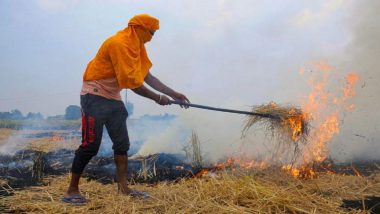Chandigarh, September 20: The stubble burning which is likely to start later this month ahead of the Rabi crop sowing season can exacerbate the Coronavirus crisis, an agricultural-cum-environment expert has cautioned.
“If alternate arrangements to stubble burning are not made, pollutants like particulate matters and toxic gases like Carbon Monoxide and Methane could give rise to severe respiratory problems, which will further worsen the COVID 19 situation, as the Coronavirus also impacts the respiratory tract," Sanjeev Nagpal, also an advisor to the Union and the Punjab governments on the crop residue management, told PTI on Sunday. Also Read | Agricultural Reforms Bills Passed in Rajya Sabha: How Will Centre Ensure Farmers Get MSP, Asks P Chidambaram.
"Last year, nearly 50,000 cases of stubble burning were reported in Punjab. Stubble burning contributes about 18 to 40 per cent of particulate matter to atmosphere in northern plains. It also emits large amounts of toxic pollutants like Methane, Carbon Monoxide and carcinogenic polycyclic aromatic hydrocarbons,” said Nagpal, also the MD of Sampurn Agri Ventures Pvt Ltd (SAVPL).
Last year's stubble burning in Punjab and Haryana had contributed to 44 percent of the pollution in NCR Delhi, according to System of Air Quality and Weather Forecasting and Research (SAFAR), the Ministry of Earth Science. Also Read | RBI Says PSBs Reported Frauds Worth Over Rs 19,964 Crore in April-June.
Nagpal said stubble burning causes not only massive air pollution but also affects the soil health, which is already in a bad shape in Punjab. The practice of stubble burning combined with excessive use of pesticides and chemical fertilizers over the years has resulted in the decrease of soluble silica, carbon and other essential nutrients in the soil, he said.
"Silicon (Si) is one of the most prevalent soil macro-elements, performing an essential function in healing plants in response to environmental stress. The loss of soluble silica in the soil has given rise to silica deficiency in humans exposing people to a greater threat of COVID 19 and other diseases.” Nagpal said.
“Insufficient amounts of silica in humans reduce their immune response towards viruses and pathogens," he added. Punjab alone produces over 55 metric tons of crop residues each year out of which over 40 per cent have been found surplus, he said.
Nagpal said the resolution lies in large scale collection of crop residue from farmers at a price by various plants and state governments, its storage, and then using technology for its conversion into organic manure and also biogas.
Nagpal's SAVPL project in Punjab's Fazilka has devised this technology in association with IIT and PAU, Ludhiana. The project had purchased about 10,000 MTs of paddy straw last year which benefitted around 500 farmers, he claimed.
The plant is making 8 MTs of silica manure per day now against a total capacity of 25 MTs per day, he said, adding the capacity of the project is to process 15,000 MTs of crop residue every year. “Our concept is to process stubble to make silica-rich manure that will improve soil health and food quality thereby improving people's health. We want the Punjab government to give a fillip to the model of 'crop residue management through its conversion into manure so that it is replicated across the state,” said Nagpal.
“This will not only solve the stubble burning problem but will also help produce healthy food thereby helping farmers get better prices for quality food and consumers a chance to buy directly from farmers at a reasonable price,” he said.
(The above story is verified and authored by Press Trust of India (PTI) staff. PTI, India’s premier news agency, employs more than 400 journalists and 500 stringers to cover almost every district and small town in India.. The views appearing in the above post do not reflect the opinions of LatestLY)













 Quickly
Quickly


